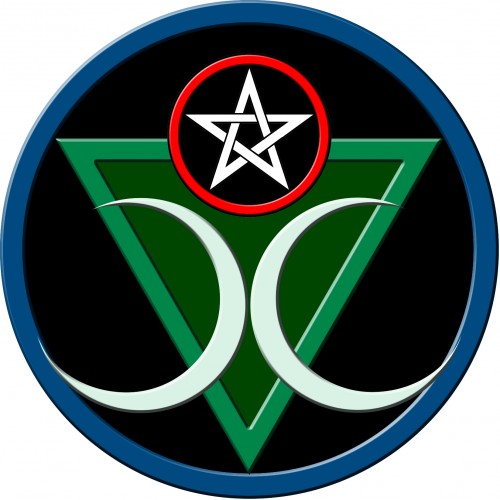After publishing an SEO-optimized post about a great new pin, I tweeted the URL which auto-shared to my fan-page status update. If you don’t mind, could you go and +1 it?
Did you get that? Some of it? If you are social media junkie, it made perfect sense and you are probably about to head over the Google+. If not, you might be drowning in the social media frenzy that has taken over the internet.

Photo Courtesy Flickr’s caribb
Given my background, I frequently get asked questions about social media. “Why should I use it?” or “How can it help my organization?” “Which sites should I be on?” and “Is Facebook really a covert CIA organization plotting to replace humanity with cyborg intelligence?” While I can’t answer that final question, I thought I’d spend some time responding to the others as they relate specifically to the Pagan community.
The first and most obvious question is “What is social media?” According to business marketing experts, Andreas Kaplan and Michael Haenlein:
“..a group of Internet-based applications that allow the creation and exchange of user-generated content” (International Associate of Exhibits and Events)
In simple terms, social media is a virtual arena where you, the user, can see and be seen? Better yet, hear and be heard. No, that doesn’t work either. Let’s try this. It is the modern village festival, the town square, the party line, Usenet, the chat room, and even the text-based MUCKS (multi-user-chat-kingdoms).
 As of today, what are the most popular social media sites? First, we have the behemoth known as Facebook with 61% of worldwide social media market share. In distant second, we find Twitter, Pinterest and StumbleUpon. To make the on-line party more titillating, there are social media adds-on such as the ever-popular YouTube, Instagram, Flickr, Four Square and others. For those wondering, MySpace, a victim of Facebook’s world domination, was recently re-launched by its new celebrity owner, Justin Timberlake, and is trying to make a glamorous comeback.
As of today, what are the most popular social media sites? First, we have the behemoth known as Facebook with 61% of worldwide social media market share. In distant second, we find Twitter, Pinterest and StumbleUpon. To make the on-line party more titillating, there are social media adds-on such as the ever-popular YouTube, Instagram, Flickr, Four Square and others. For those wondering, MySpace, a victim of Facebook’s world domination, was recently re-launched by its new celebrity owner, Justin Timberlake, and is trying to make a glamorous comeback.
Oh yea, and there is also Google+.
Alongside the A-listers, countless special-interest social media sites have appeared on the scene. Whether you’re a scientist or reader, a cat lover or environmentalist, there’s a second-tier site just for you. Pagans are no exception. Sites such as Wiccan Together, Witchbook, and Paganspace are exclusively dedicated to the “magick” of social networking.
![]()
In fact, for some Pagans, these dedicated sites are more than workplace distractions. They provide a much-needed spiritual community when a real one is not available. Not everyone lives in Pagan-rich areas complete with festivals, metaphysical stores, and private groups. Additionally, not everyone is able to be openly Pagan. Sites like Witchbook and Paganspace are the doorways to like-minded individuals.
Admittedly, I have never used any of the Pagan-dedicated sites. I simply don’t have time, which brings me to the next question, “Which ones should I use?” The answer for individuals is very different from the answer for organizations and businesses.
 For the individual, the choice is simple. Pick a few sites that cater to your interests and have fun. If you love visuals, crafts, and recipes, use Pinterest. If you need a business network, use LInkedIn. If you prefer to succinctly spew forth your opinions, try microblogging on Twitter. If you like Justin Timberlake, open a MySpace account.
For the individual, the choice is simple. Pick a few sites that cater to your interests and have fun. If you love visuals, crafts, and recipes, use Pinterest. If you need a business network, use LInkedIn. If you prefer to succinctly spew forth your opinions, try microblogging on Twitter. If you like Justin Timberlake, open a MySpace account.
For organizations, businesses or artisans, the choice becomes a bit more complicated, whether your endeavor is Pagan-based or not. Without getting into the nitty gritty of social media marketing, I suggest that you answer these five key questions before making any social media plunge:
- What is my product or service?
- What is my ultimate goal?
- Who is my target audience?
- Which platforms are they using?
- What is my budget?
Once these questions are answered, an effective, stream-lined, integrated social media marketing strategy can be firmly enacted to give your organization or business a solid digital presence.
Now, this all sounds so digitally glorious but there are some major pitfalls. For businesses and organizations, the biggest hurdle stems from the misconception that a big following equates to a desired return, financial or otherwise. Just because someone liked your Facebook fan page, doesn’t guarantee that he or she will ever buy one of your hand-crafted ritual robes.
Unfortunately, that’s the nature of social media. “Likes” and “Follows” are the proverbial carrot in front of the horse. They just dangle there in front of marketers, enticing them to keep playing the social media game.

Covenant of the Goddess
Regardless, all business and organizations should have a social media presence. For Pagan entities, a strong presence can aid the quest for social legitimacy while providing a doorway allowing the public access to good information. Perhaps more importantly, social media can bridge the gap between the generations by connecting older, traditional organizations like Covenant of the Goddess and Circle Sanctuary, to the younger, tech-savvy generations. Social media could be the broomstick that takes Paganism into the future.
However, there are bigger concerns, legal and sociological, that loom over the entire social media experience. Who has a right to censor your feeds? When does social media become public media? Are you living your real-life just to have something good to post? And, finally and most importantly, as humans, are we facing a possible disintegration of real-world social skills?
The time we spend sharing, following, and liking takes away from sharing time with friends, following dreams and liking new experiences. While social media does help build connections in ways that weren’t previously possible, we must not allow it to overtake real life. That is especially true for Pagans whose spirituality is tied so strongly to the natural world.
 You can’t watch a sunset on Twitter. You can’t feel the full moon rise on Youtube. You can’t hear a friend’s rhythmic drumming during a cold Solstice Eve on Pinterest. We still need our live seasonal festivals. We still need brick-and-mortar community centers and energy filled circles. No doubt that social media plays an important and useful role in our lives but it must be intertwined with live experience – capturing it, sharing it but never replacing it.
You can’t watch a sunset on Twitter. You can’t feel the full moon rise on Youtube. You can’t hear a friend’s rhythmic drumming during a cold Solstice Eve on Pinterest. We still need our live seasonal festivals. We still need brick-and-mortar community centers and energy filled circles. No doubt that social media plays an important and useful role in our lives but it must be intertwined with live experience – capturing it, sharing it but never replacing it.
(Now feel free to click the buttons below to like this, share this, pin this and, while you’re at it, don’t forget the +1)
The Wild Hunt is not responsible for links to external content.
To join a conversation on this post:
Visit our The Wild Hunt subreddit! Point your favorite browser to https://www.reddit.com/r/The_Wild_Hunt_News/, then click “JOIN”. Make sure to click the bell, too, to be notified of new articles posted to our subreddit.
Hello! Just found this blog when a large number of your readers signed up on Witchbook.net, Very well written!
How about a middle-way answer to your opening question: “Yes, I get it, but I don’t care that much”?
Seriously,
“Who is my target audience?” is the big question, isn’t it. As a
writer, even though I have a blog — two blogs, actually, with different
purposes and feeds to Facebook — I cannot necessarily tell who the
readers are! Oh, I can see that one came from Calgary and one came from
Orlando and one from Stockholm, but that does not answer the questions
of who and why.
Social media do help you maintain a sort of
ghostly presence between big projects, but maintaining that presence,
many would argue, may take energy away from the big projects!
Laugh. There is that mid-way response.
I’ve written about the burden of maintaining presence on my own blog. I didn’t get into that issue here. But I agree that’s why refining and streamlining your SM world is so important.
Kudos for recognizing that media are plural (singular: medium).
well for starters we don’t preface all social networks with the word ‘the’.
Never did do myspace, facebook, A-O-Hell, or twitter. Don’t intend to change that. But I did recently find myself signing onto google+
Was on Paganspace for a few years, but left that site a couple of years ago when I got tired of what appeared to be “admin-approved trolls” lording it over other users and attacking newbies for their inevitable little transgressions of “rules” they couldn’t be familiar with as yet. I had also tried several other “Pagan Social Networking” websites, but too often found them disappearing out from under me without notice.
Although we have trees and grass and a stone-pit fire circle here in Greene, Maine (instead off literal ‘brick and mortar’), on offer to our local Pagan communities since 2005, there still isn’t much in the way of in-person communal gatherings that come here. Never did see how worldwide social media would be of much use in our local geographical area. From what I’ve seen, even the Yahoo groups some local Pagan communities have set up for themselves get very little use.
While I’m not really an “anti-social” person, you can accurately accuse me of being a-social, as there were so many things I never got to learn while growing up, not being one of the “cool kids” or “beautiful people” or wanting to be a hanger-on or flunky to either type.
Just a couple of months ago, I found myself trying to remember when the last time I had an actual ‘mere conversation’ with another person was. Outside of classroom discussions, the longest conversations I seem to have are with cashiers while going through the check-out line at some store or other. This has less to do with spending so much time on the Internet, as it has to do with the thousands of times I’ve tried to join in conversations in groups I was supposedly a part of, only to give up after beginning the same sentence several times only to be talked over by someone else, without anybody noticing that they’d briefly heard my rather-loud voice for a moment.
It brings one to just giving up on talking to people, to bothering to even try to make friends with such self-centered folk. Well, that’s something I actually don’t spend any time trying to do any more, not in person.
And no, I don’t confuse Internet acquaintances with actual “friends,” either.
Heather,
How do you react to the recent reversal of Scarlet Imprint in terms of using social media websites as ways to facilitate the translation of information to their customers? What could you recommend to people who are in that mode of believing that social media “rots the brain” as it were, as they suggested?
I only bring this up because I’m curious. I use Farcebook personally, and do not have any kind of realistic presence other than that. I tend to keep myself pretty much isolated even on social networking sites.
“You can’t watch a sunset on Twitter. You can’t feel the full moon rise on Youtube. You can’t hear a friend’s rhythmic drumming during a cold Solstice Eve on Pinterest.”
My eyes just rolled so far back into my head that I think I need an exorcist.
Anonymous troll is anonymous.
opinions = trolling
cool.
And that, right there, is the true heart of the flaw of social media.
You can be whoever you want to be, whilst never really being yourself.
The anonymity you get online makes trolling so much easier than trying it in person.
If someone was to blatantly bait me in real life, I’d be tempted to carve an Odal rune into their forehead.
Mind you, am I just saying that, safe in the knowledge that it is not something I ever have to back up, or am I actually prone to violent outbursts? That’s the joy of the internet – I leave it up to others to guess where humour comes into play.
opinions = trolling
cool
I can see how that was such an important opinion to share. Maybe I would have respected it more if you had the guts to use your real name when insulting one of my writers.
I was saying they wrote something a little bit saccharine and goofy sounding. I’m not insulting them on a personal level. Chill the fuck out.
So,
“My eyes just rolled so far back into my head that I think I need an exorcist.” = “…they wrote something a little bit saccharine and goofy sounding.”
Interesting. So, using that metric, calling you an “anonymous troll” should really translate for you as, say, “person with an opinion about something.” So you shouldn’t be offended.
Likewise, I suppose “chill the fuck out,” in your land, means, I’m glad we could have this civil discourse.
(it means you’re getting really mad about people on the internet having opinions you don’t like and you should maybe chill out)
(also I’m glad we could have this civil discourse)
For the record I’m not mad, I just wish people had the courage of their convictions.
Have a good day!
You too friendo!
:3
Well, I’ll back up what the anon said. Reminders, especially with that kind of glurgey wording, to leave the internet and “go outside” and “have REAL experiences” on articles about the internet are just silly, tired, and rather patronizing. (Raise your hand, netvets, if you couldn’t paper your walls with dimes for every time you’ve heard some variation on this theme.) Also, the author might want to consider that many of the people who are spending way more time online than in face-to-face-space (I hate “meatspace”, and I don’t consider what I’m doing here to be “fake life”) have a reason for that– a lot of us are people with disabilities that make having “real experiences” rather difficult. I hate this idea that what happens online isn’t real, that friendships made online aren’t real, or that the internet needs a “like it, but don’t like it too much!” caution label on it. It isn’t the same as face-to-face interaction, but I’ll stand firmly on ground that says that it’s also not inferior. Different, but not inferior.
(I’m also not a fan of “say it under your real name or it doesn’t count”, particularly in subcultural spaces where there’s a real potential cost to using your legal name. Some of this, however, may be bias gained from spending a lot of time in a space where everyone is “anonymous” (no, not 4chan) and finding some of the best discussion I’ve had anywhere due to the freedom from weighting people’s comments more or less depending on who they are. I think there’s an interesting discussion that could be had about the value of pseudonyms in Pagan discourse (just as we had a good round of discussion in fandom about this), and I often wish ardently for an all-anonymous Pagan space to see what opinions might come to light that otherwise wouldn’t if there’s a BNP to shut the discussion down.)
tl;dr: Anon is snarky but I think they’ve got a point.
Even if we were to concede that your points are valid, ultimately, it’s hard to take someone seriously who uses the name “blahblahblahblah” and has a one line snarky comment. That has troll written all over it, as far as I’m concerned. Someone can be anonymous and express disagreement with a blog post in a responsible, adult way and be taken seriously if it’s really that important to them. It’s a little disingenuous for this person to comment in the way they did with the names they used and then try to act as though they’re being censored when no one takes them seriously and thinks they are trolling.
Does Google+ still demand that people use their ‘wallet name” for their account? That and their “one ring to rule them all” philosophy put me off on using it for Pagan things.
This does not belong here. I visit the Wild Hunt expecting a high level of pertinent, well written journalism, and experience has shown that that’s what I will almost certainly get. It sort of pisses me off when I invest time in a long article only to find out it’s just some rehashed fluff on a cliche topic. The article is completely scattered, has little (if nothing) to do with paganism, presents no news or information I couldn’t find a million other places…just no. It’s not up to the standards.
You hadn’t noticed that the Wild Hunt has expanded its remit from a one-man brand of Pagan News delivery to a collective media enterprise that does not purely deal in headlines but also has editorial and perspectives?
I have noticed, and while change is fine, I don’t want the change to include the standards of journalism.
I thought the standard of this article was pretty good, actually. Sure, discussing the place of social media in Paganism is hardly going to win a pulitzer, but it still has a place in the Wild Hunt, as far as I am concerned.
It felt rather more like “explaining social media to Pagans, by a Pagan.” Unnecessary.
Perspective pieces are not my favorite things, but they can be occasionally good if they bring something fresh to the table. However, IMO one has to be really…really skilled to pull it off. Musing out loud with no substance, no new information, is just empty and forgettable…and that’s the impression I’m left with.
@google-ead3a55956d005837dc796546361ca35:disqus Agree completely. It’s a shallow gloss on “what is social media” for complete beginners, aimed at probably the most technophilic religious group in existence– I find it an odd choice. No mention of blogs or fora? No mention of, if you’re doing a round of the really popular social media sites right now, Tumblr? (And yet mention of MySpace?) Also, mention of the author’s background without explanation of what that background *is*, and the, as you said, scattered focus between individual use and business use. There are a ton of interesting things that could be said about social media from a Pagan perspective, but this reads like something I could find in USA Today, with a bit about two Pagan-specific sites (that the author mentions she does not use) shoehorned in.
I enjoyed this piece. I was surprised to see it but welcomed the information and the way it was delivered. I hope to see more from this writer. The piece was not fluff but was fluffy. Fluffy isn’t terrible. It was an entertaining piece over all. I found that it was pertinent to paganism with the mention of a new (to me at least) site.